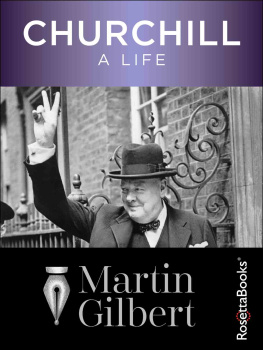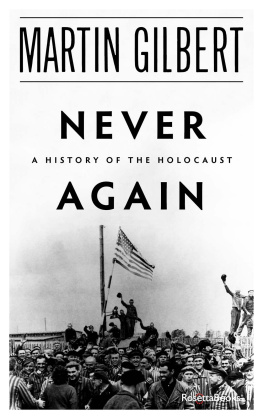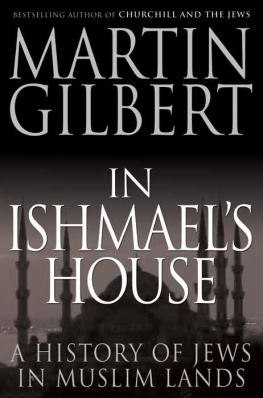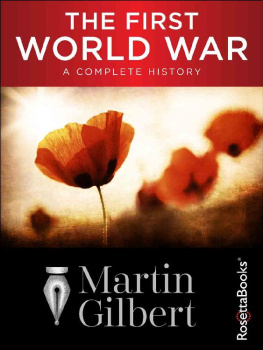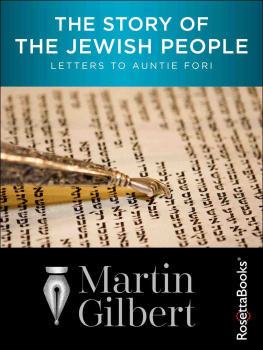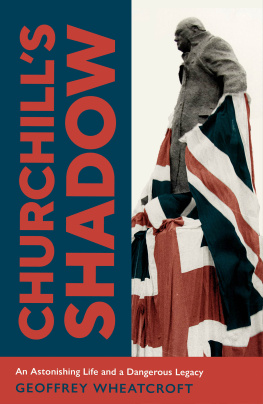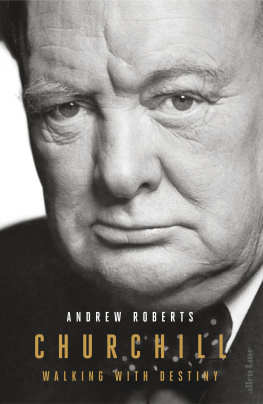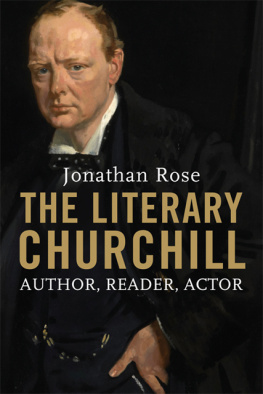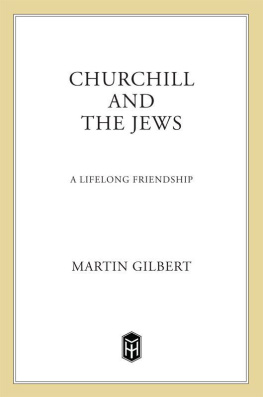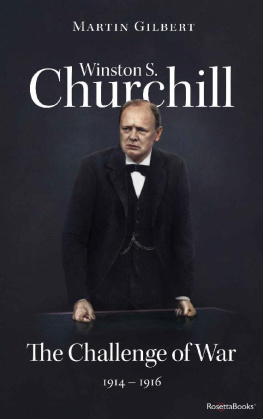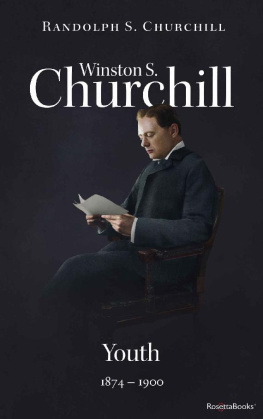Churchill: A Life
Martin Gilbert
Copyright
Churchill: A Life
Copyright 1991, 2014 by Martin Gilbert
Cover art, special contents, and Electronic Edition 2014 by RosettaBooks LLC
All rights reserved. No part of this book may be used or reproduced in any form or by any electronic or mechanical means, including information storage and retrieval systems, without permission in writing from the publisher, except by a reviewer who may quote brief passages in a review.
Cover jacket design by David Ter-Avanesyan/Ter33Design
ISBN e-Pub edition: 9780795337260
Contents
Acknowledgements
40. Last Years
Maps
Preface
It is my aim in these pages to give a full and rounded picture of Churchills life, both in its personal and political aspects. His career has been the subject of countless books and essays, in which he has sometimes been cavalierly, sometimes harshly, judged. I have sought to give a balanced appraisal, based on his actual thoughts, actions, achievements and beliefs, as opposed to the many misconceptions that exist.
The record of Churchills life is a particularly full one, for which a vast mass of contemporary material survives. It is therefore possible, for almost every incident in which he was involved, to present his own words and arguments, his thinking, his true intentions, and his precise actions.
My own researches began in October 1962, when I started work as the junior member of Randolph Churchills research team, a year after he had been asked by his father to undertake the writing of a multi-volume biography, and edition of supporting documents. At the time of his death in 1968, Randolph Churchill had taken his fathers story up to the outbreak of war in 1914. I was asked to continue his work. My own final volume, the eighth in the series, ended with Churchills death at the age of ninety.
The official biography, as it has become known, set out in detail the story of Churchills life based upon five main sources, each of which I have returned to for this one-volume account; from these sources I have also drawn much new material, particularly for Churchills earlier years, up to the First World War.
The first of these sources is Churchills own enormous personal archive of political, Ministerial, literary and personal correspondence, now at Churchill College, Cambridge. This contains private and public correspondence spanning the whole of his ninety years.
The second source is his wife Clementines papers, including the many hundreds of letters which her husband wrote to her from the time of their marriage in 1908 until his last years. This is under the custody of Churchills daughter, Lady Soames, and gives a remarkable picture of every aspect of Churchills personality.
The third source is the Government archive of Churchills two Premierships, and of his official Ministerial work, which began in December 1905, and continued until his retirement from public life in April 1955. This archive, located at the Public Record Office at Kew, contains all the War Cabinet and Chiefs of Staff discussions for the Second World War, as well as the papers of his eleven Ministries during those years, and of the War Council on which he served in 1914 and 1915.
The fourth source is the private archives, some of them substantial, others fragmentary, of his friends, colleagues and opponents; those who had been in contact with him at different times throughout his life. These materials are to be found in many archives, libraries and private collections, in Britain and abroad. They show how he struck his contemporaries: what they said about him among themselves; how some detested him, and how others, from his earliest years, saw him as a person of exceptional qualities, and as a future Prime Minister.
The fifth source, which I myself built up during thirty years, is the personal recollections of Churchills family, his friends and his contemporaries. These recollections come from people in all walks of life, among others from the pilots who taught him to fly before the First World War and the officers and men who served with him on the Western Front in 1916. I was fortunate to meet, and to get to know, his literary assistants of the pre- and postwar years, including Maurice Ashley, Sir William Deakin and Denis Kelly; his Private Secretaries, among them Sir Herbert Creedy, who was with him in 1919, and members of his Second World War Private Office, including Sir John Martin, Sir John Peck and Sir John Colville; also Anthony Montague Browne, who was with him from 1953 to 1965.
As Churchills biographer, I was particularly fortunate to have been able to see him from the perspective of his secretaries, among them Kathleen Hill, who joined him in 1936, Elizabeth Layton and Marian Holmes, who worked with him during the Second World War, and Elizabeth Gilliatt, Lady Onslow, Jane Portal and Doreen Pugh, who were with him in his later years. So much of Churchills life was spent at Chartwell; Grace Hamblin, who worked there since 1932, has been a guide to those years.
Several million words drawn from these five sources are edited and annotated in the volumes of documents published (and still being published) for each of the volumes of the multi-volume biography.
***
I have set out to provide enough material in this single volume for readers to judge for themselves Churchills actions and abilities during his remarkably long career. It was a career often marked by controversy and dogged by antagonism; for he was always outspoken and independent, and expressed his views without prevarication, criticising those whom he thought were wrong with a powerful armoury of knowledge, and with vivid, adept and penetrating language.
Churchills involvement in public life spanned more than fifty years. He had held eight Cabinet posts before he became Prime Minister. When he resigned from his second Premiership in 1955 he had been a Parliamentarian for fifty-five years. The range of his activities and experiences was extraordinary. He received his Army commission during the reign of Queen Victoria, and took part in the cavalry charge at Omdurman. He was closely involved in the early development of aviation, learning to fly before the First World War, and establishing the Royal Naval Air Service. He was closely involved in the inception of the tank. He was a pioneer in the development of anti-aircraft defence, and in the evolution of aerial warfare. He foresaw the building of weapons of mass destruction, and in his last speech to Parliament proposed using the existence of the hydrogen bomb, and its deterrent power, as the basis for world disarmament.
From his early years, Churchill had an uncanny understanding and vision of the future unfolding of events. He had a strong faith in his own ability to contribute to the survival of civilisation, and the improvement of the material well-being of mankind. His military training, and his natural inventiveness, gave him great insight into the nature of war and society. He was also a man whose personal courage, whether on the battlefields of Empire at the turn of the century, on the Western Front in 1916, or in Athens in 1944, was matched with a deep understanding of the horrors of war and the devastation of battle.
Both in his Liberal and Conservative years, Churchill was a radical; a believer in the need for the State to take an active part, both by legislation and finance, in ensuring minimum standards of life, labour and social well-being for all citizens. Among the areas of social reform in which he took a leading part, including drafting substantial legislation, were prison reform, unemployment insurance, State-aided pensions for widows and orphans, a permanent arbitration machinery for labour disputes, State assistance for those in search of employment, shorter hours of work, and improved conditions on the shop and factory floor. He was also an advocate of a National Health Service, of wider access to education, of the taxation of excess profits, and of profit-sharing by employees. In his first public speech, in 1897, three years before he entered Parliament, he looked forward to the day when the labourer would become a shareholder in the business in which he worked.

